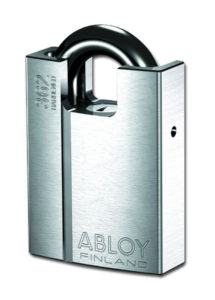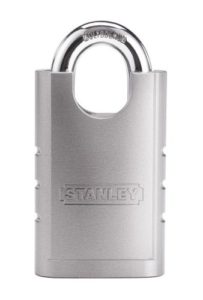Sometimes you just need a great padlock. Whether you are securing outdoor storage bins or sheds, or the gate into your backyard, you want a padlock that will resist attempts to pick it or knock it free with a hammer. There are many padlock brands and styles, and the range in quality is huge, and many of these locks can be defeated by just about anyone. So, before you purchase a padlock, here are some important things you should know.
Don’t Buy a Cheap Padlock
There are many products on the market, such as designer clothes that cost more simply because of the name on the label. They may or may not be any better quality than a similar generic item. However, there are some products where the price is more likely to actually reflect the quality of the materials and workmanship. Locks are in that category. So, if you are buying a padlock because you want to protect what you are keeping behind it, don’t skimp on price. Yes, you can get a padlock for $1.75, but I’d only use it to protect something worth less than the lock! To get a great padlock, you do have to spend a little more, but a good padlock needn’t break the bank!
Look for Shackle Covers
The shackle of the padlock is the curved piece at the top of the lock that goes through the holes of the latch that the lock is securing. Standard padlocks that have nothing covering the shackle where it enters the lock body can easily be shimmed. This is done by inserting a small shim into the slot where the shackle goes into the body and pushing it in until it moves the locking mechanism away from the shackle, releasing the lock. Exposed shackles can also be cut. Shackle covers, also known as shoulder shrouds, provide an extra layer of metal covering and protecting the shackle. The thicker the shackle cover, the better! And the more it covers the shackle, the harder it is to shim the lock or cut the shackle.
Size Matters
Larger locks with more metal and thicker shackles are harder to defeat than smaller padlocks. Of course, this is only true if the lock is made with strong, quality materials. Clearly, a lock that is made with cheap materials and poor design or workmanship will not be more secure just because it is large. Any padlock can be broken if it is submitted to enough brute force. However, well-made locks that are manufactured with strong metals like hardened steel, boron alloy or boron carbide, or molybdenum carbide alloy do become harder to breach when they are larger and heavier. So, when purchasing a high-security padlock, go large!
Go Hard Core
Many padlocks are ridiculously easy to pick. This is why a hard core is so important. The core is the part of the lock into which you insert the key. It is like the plug or cylinder in a deadbolt, and it is where the pins are. The pins are the mechanisms that work with the key to release the lock, so the more intricate the pin system is, the harder it is to pick the lock. Look for locks with more pins and locks that use security pins. 90% of padlocks have 5 pins. Look for a lock with 6 or 7 pins for added security.
Look for an Anti-Drill Plate
Anti-drill plates are ceramic or hardened metal inserts that are placed inside the lock to interfere with any attempt to drill the lock by deflecting the drill or rotating and preventing the drill from gaining any traction.
Our Recommendations

Fort Lauderdale locksmith Lock N More recommends the Stanley Hardware CD8820 model. It has 6 anti-pick pins, is made with molybdenum alloy steel, has a shrouded shackle, anti-drill plates, and a removable core. They can be purchased for under $50.00. Or, if you wish to spend a little more, you can go for the Abloy PL362, coming in at around $325.00. This lock employs a disc detainer system instead of pins and has over two billion key combinations. It is a large, incredibly tough hardened steel lock with a boron alloy shackle, shrouded in hardened steel.

 (727) 235-6006
(727) 235-6006
